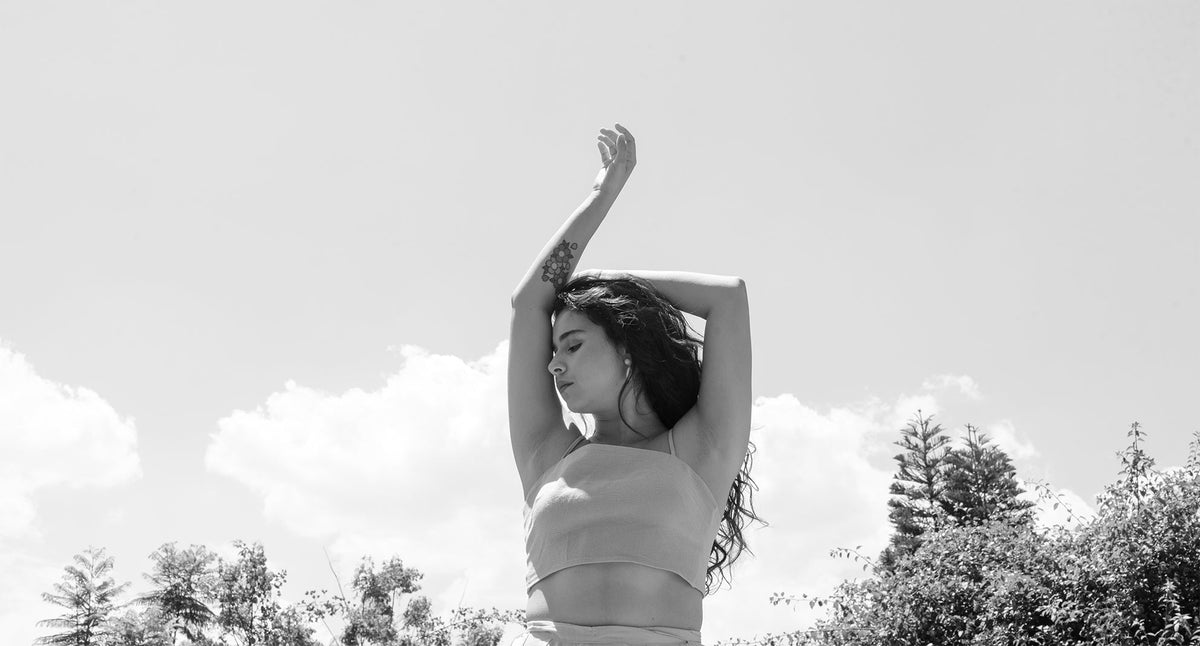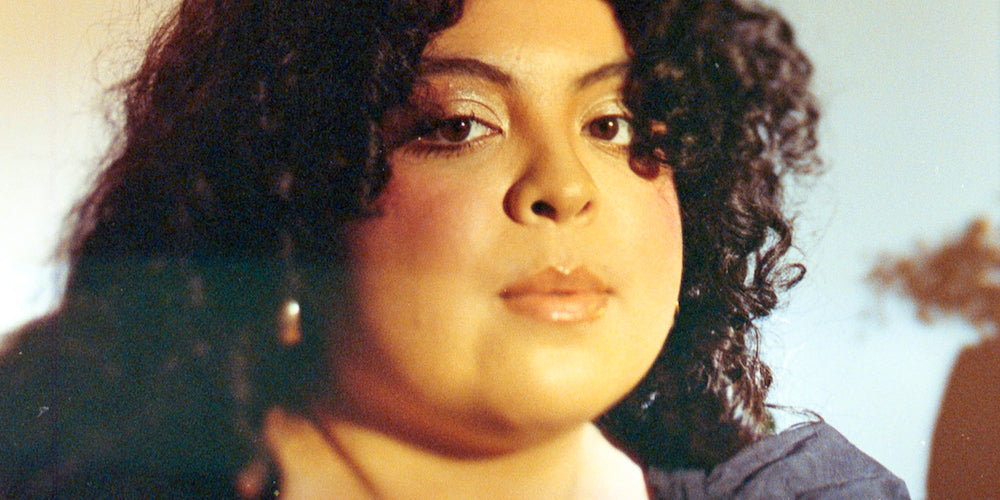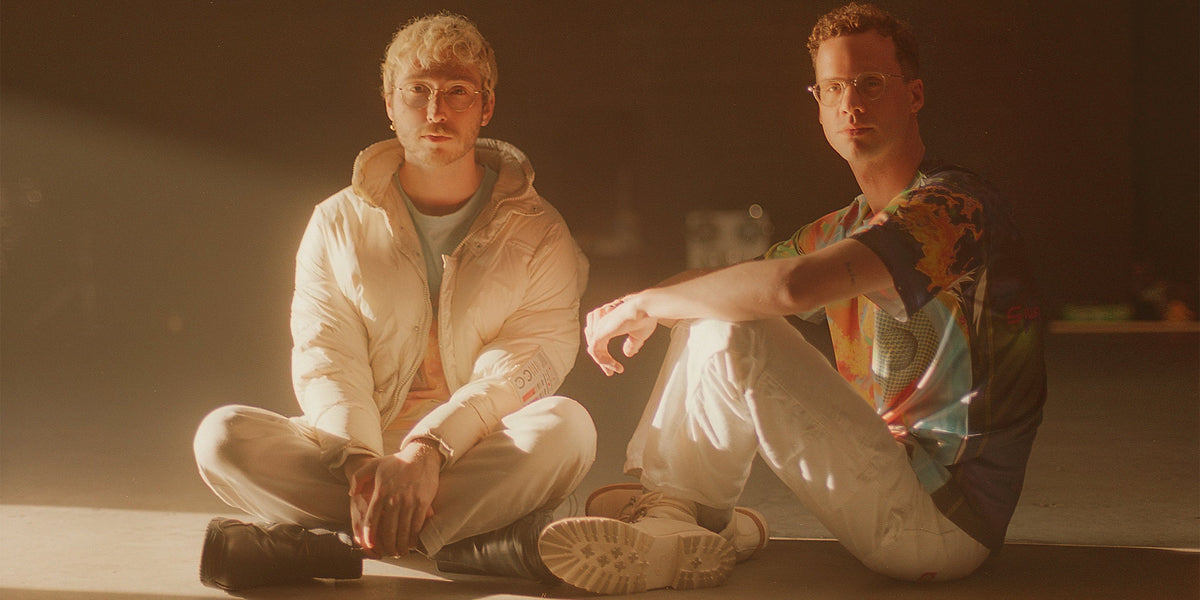‘The Last Spa on Earth’: Divino Niño’s Chaotic Catharsis
Divino Niño’s fourth album, Last Spa on Earth, conjures up the thrill of a dreamy, forbidden crush. Making the record was sort of a reciprocal experience for the Chicago band, who were in the midst of chaos and uncertainty. “We were in a Wisconsin cabin in the middle of the pandemic … it was so cold and snowing the whole time,” recalls vocalist/guitarist Camilo Medina. They were “drinking and making music until 4 a.m.” every day, he says, “Then JV started playing some spa-like keyboards … and Guillermo blurted out, ‘The last spa on Earth.’ It felt so apocalyptic what we were experiencing in that cabin, like the last moment.”
That euphoric yet tumultuous time combined with Divino Niño’s knack for navigating hypnagogic and hyperpop, and their newfound infatuation with experimental reggaeton — led by neoperreo provocateurs Tomasa del Real and Ms Nina — sealed their new seditious sound with a kiss. “They’re fearless,” adds Medina about the neoperreo women in charge. “I think we were feeling like, ‘Yo, girls, dominate me. I’m stupid. You lead me,’” he says, and chuckles.
Although their earlier sonic lo-fi incarnations delved deeper into whimsical experimentations, Last Spa is buoyed by glitz, grit and grime, and it feels precariously liberating, like a leap toward 40 oz of freedom. Also bolstered by Javier Forero on vocals and bass, Guillermo Rodriguez-Torres on vocals and guitar, Pierce Codina on percussion and Justin Vittori (aka JV) on keys, the group’s helping lead a new generation of insouciant rebellion. They lyrically and aesthetically defy the systems of the church they grew up on, all while partying the indie pop way, and embracing their bilingual, immigrant culture.
VMP met up with Medina, Forero and Rodriguez-Torres via Skype to discuss their venturous Last Spa on Earth, religious iconography and questioning everything.
This interview has been condensed and edited for clarity.
VMP: Talk to me about the foundations of Divino Niño. How did you all become a band?
Camilo Medina: Javi and I have been in bands for over a decade, since [we both lived in] Miami. Guillermo was my roommate at the time, then Javi moved in with us, so the three of us started Divino Niño. I think we were first called Continental Breakfast, or some bullshit like that. We all went to school in Chicago, and played music then. Then the two additional members, JV and Pierce, joined later in the past couple of years.
Javier Forero: We were roommates in some apartment in Lake View where maybe eight people lived, so rent was pretty cheap. We were just hanging out in the living room. I was inspired by some of our artist friends in Miami who were in bands, and they had this band called Ice Cream, and the whole branding was very Satanic. We were like, wouldn’t it be funny if that’s how it started. If the band was called Bible Study or Youth Group, and then from there on, we decided on Baby Jesus.
Camilo and Javier, I read that your childhood together dates back to Colombia. How do you guys know each other from South America?
Camilo: We're friends, but it’s like we’re siblings. We met each other when we were three or four years old in Bogotá. By coincidence, we found each other again in Miami in seventh grade, and it was like, “Yo, Javier!” “Yo, Camilo!” From then on, Javi invited me to this culty church he was part of, and I was just like, “OK, I’ll go.” Then we started playing music.
Javier: Side note, his mom had a VHS recording of us dancing at his five-year-old birthday party. We’re just hanging out, and I’m like, “Oh my God, I’ve known this homie for a while.”
How about you, Guillermo?
Guillermo Rodriguez-Torres: No, I was born in Bayamón, Puerto Rico, and my dad is from Venezuela.
Camilo: Pierce’s dad is Cuban and his mom is from Alabama, but he grew up in Argentina and Mexico, and JV is from the Midwest, Chicago.
There’s a more danceable vibe, and new neo-reggaeton rhythms that you’re presenting in this album. What inspired this transition from the more mellow, indier stuff?
Camilo: Our previous album, [2019’s] Foam, is set up as more indie. It’s mostly in English. We hang out with the Chicago indie music scene here with our friends, Whitney, Twin Peaks… that’s kind of our vibe here. But then when the pandemic happened and everything closed, we couldn’t hang out with anyone, so we were our only friends. We were sending each other tracks, then for some reason, we were like, “What are we doing? Why are we trying to be Sonic Youth here?! Or My Bloody Valentine?! Let's check out this Ms Nina track. This is sick!” We also discovered Isabella Lovestory, Tomasa Del Real. [We said] “Let’s do some reggaeton!” We liked that it was experimental reggaeton. It wasn’t like Daddy Yankee or J Balvin. Later on, we got into J Balvin, but at the time, we didn’t like any of the mainstream shit. Guillermo, who was born in Puerto Rico, showed us Bad Bunny before Bad Bunny blew up. The homie has always been listening to reggaeton, but for us, it was during the pandemic, but we got into reggaeton from the more obscure acts.That was kind of our gateway into it. We were like, “Yeah, we need to be fucking with this type of music.”
How did the concept for Last Spa on Earth come about?
Camilo: We were in a Wisconsin cabin in the middle of the pandemic. It was honestly depressing because we hadn’t seen each other in a couple of months, so we set aside 10 days. It was so cold and snowing the whole time. We were making tracks every day trying to cook up this record, but with a really “healthy” lifestyle, drinking and making music until 4 a.m. and waking up at 1 p.m. Honestly, I was feeling so shitty. Then in the middle of one of those sessions, JV started playing some spa-like keyboards. We were all kind of faded, and Guillermo blurted out, “The last spa on Earth.” It felt so apocalyptic what we were experiencing in that cabin, like the last moment.
Javier: As JV was playing the spa, kind of jazzy chords on the piano, we all sat down on the floor and passed around a microphone. We said whatever came to our heads. And Guillermo was the one that said, “This is the last spa on Earth.” We didn't keep the track the way that it [was], but it was a stream of consciousness kind of vibe.
Guillermo: There is also the connection between [the title track] “LSE” and LSD. Read into what you will.
“Tu Tonto” reminds me of being head over heels about someone, but with a tinge of chaos. Can you share some words behind the songwriting? Are they based on real-life experiences?
Camilo: That’s one of the first tracks that we wrote [for the album]. The same weekend that we discovered Bad Gyal and Ms Nina, we were like, “Yo, let’s attempt to do something like that because this is fresh.” Something I really liked about neoperreo is that it felt new, in comparison to the old reggaeton. It’s led by mostly women, and they're fearless. They talk about sex in such an explicit way. I think we were feeling like, “Yo, girls, dominate me. I’m stupid. You lead me.” That’s why it’s called “Tu Tonto,” because we’re like, “No, we’re the dumb ones.” You know what I’m saying? It was more out of respect because a lot of the reggaeton that I was familiar with are about “este culaso,” or whatever. It was new for me to see these women talk about sex.
Your video “XO” takes place in a church, and you guys get baptized. Obviously your stage name has a religious connotation, and you’re touring with Little Jesus. How does religious iconography play a role in your band?
Camilo: Great question. I was talking about this with my mom the other day because she hated that video. It made me reflect on the way that I was raised — maybe Javi, too, since we’re from Colombia — being kind of obedient. [Society] tells us, “God is this. This is the way to pray. This is how you dress. This is how you make art. This is how you need to make money.” Then we respond like, “Oh, sí sí” (does a praying gesture). We’ve been given all these rules, and we’ve been so obedient to all of these things that somebody else came up with. Religious imagery looks different in every type of community or civilization around the world. They all have a God who comes in different shapes, [and is represented by] different symbols. For some reason, the one we grew up with was the cross and Divino Niño. We are not trying to disrespect or be like, “haha, the church.” But how about we question what [religious leaders] tell us about how to pray and look? These images are sacred; by [us] poking fun at them, we're hoping to artistically [inspire our viewers to] question everything, your mama, your dad, your boyfriend. Don't let anyone tell you how to live your life and how things work. Also, aesthetically, crosses are just cool. Jesus looks fucking dope, all bloody and shit.
Javier: Jesus on the cross bleeding is pretty brutal. Besides questioning everything — like what you’re doing in life, and forming your own thoughts and opinions — growing up in a Christian church, going from Catholic to Christian, I feel like there is still some spirituality that is very special. In our music you can find those themes. Last Spa on Earth is supposed to be almost like going to heaven, if you want to call it that. It’s this ecstasy that connects you with others, and to feel that connectedness. Some people find it through religion, but that’s not really the only way to achieve that kind of feeling. It could be through meditation, taking a walk in the park, going on a hike, or experiencing the Earth and the sublime.
Isabela Raygoza is a writer, curator and producer who specializes in Latin music both regional and mainstream, and who approaches her work across genres with an eye toward the history that shapes our culture and the culture that shapes our future. She’s lent her pen to Rolling Stone, Billboard, VICE and the Recording Academy/GRAMMYs, among others, and honed her production skills with SoundCloud and Audible.
Related Articles
Join the Club!
Join Now, Starting at $36Pages








